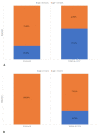Serum Allergen-Specific IgE among Pediatric Patients with Primary Immunodeficiency
- PMID: 35455510
- PMCID: PMC9029572
- DOI: 10.3390/children9040466
Serum Allergen-Specific IgE among Pediatric Patients with Primary Immunodeficiency
Abstract
Background: Allergy is a clinical condition that reflects a deviated function of the immune system. The purpose of this study was to evaluate serum allergen-specific IgE (sIgE) along with clinical manifestations of allergy in patients with diagnosed primary immunodeficiency (PID). Methods: 72 patients, aged 1−17 years, diagnosed with PID and hospitalized between July 2020 and February 2021 were included in the study. Blood samples were obtained by venipuncture. sIgE (30 allergens), blood eosinophil count, as well as total IgE and IgG were measured and assessed in relation to a detailed medical examination. Results: Serum sIgE was detected in the blood of 50% of the patients in the study group, which significantly correlated (p < 0.0001) with clinical symptoms of allergy. During the period of the study, 61.1% of the patients showed symptoms of allergy, with 77.27% of them having tested positive for sIgE. The total IgE level was elevated in 18.06% of the patients and correlated with clinical symptoms of allergy (p = 0.004). An elevated total IgE level was not observed in children receiving immunoglobulin replacement therapy. Conclusion: The study showed that serum sIgE and total IgE together might be a plausible diagnostic tool for PID patients. However, for patients receiving immunoglobulin replacement therapy, the assessment of total IgE is not useful.
Keywords: allergy; immunoglobulin E (IgE); inborn errors of immunity; primary immunodeficiency (PID); specific IgE (sIgE).
Conflict of interest statement
The authors declare no conflict of interest in relation to this manuscript.
Figures



Similar articles
-
Effect of perennial dust mites allergy on symptom severity of autumn allergic rhinitis in adults.Allergy Asthma Proc. 2020 Sep 1;41(5):363-371. doi: 10.2500/aap.2020.41.200046. Allergy Asthma Proc. 2020. PMID: 32867891
-
Analysis of the immunoglobin E molecular sensitization profile in children with allergic asthma and predictive factors for the efficacy of allergy immunotherapy.Ann Transl Med. 2020 Nov;8(21):1459. doi: 10.21037/atm-20-7314. Ann Transl Med. 2020. PMID: 33313204 Free PMC article.
-
Analysis of total immunoglobulin E and specific immunoglobulin E of 3,721 patients with allergic disease.Biomed Rep. 2015 Jul;3(4):573-577. doi: 10.3892/br.2015.455. Epub 2015 Apr 29. Biomed Rep. 2015. PMID: 26171168 Free PMC article.
-
Allergen components in diagnosing childhood hazelnut allergy: Systematic literature review and meta-analysis.Pediatr Allergy Immunol. 2020 Feb;31(2):186-196. doi: 10.1111/pai.13110. Epub 2020 Jan 1. Pediatr Allergy Immunol. 2020. PMID: 31301691
-
A Pragmatic Primary Practice Approach to Using Specific IgE in Allergy Testing in Asthma Diagnosis, Management, and Referral.J Asthma Allergy. 2022 Aug 16;15:1069-1080. doi: 10.2147/JAA.S362588. eCollection 2022. J Asthma Allergy. 2022. PMID: 35996427 Free PMC article. Review.
References
-
- Tangye S.G., Al-Herz W., Bousfiha A., Chatila T., Cunningham-Rundles C., Etzioni A., Franco J.L., Holland S.M., Klein C., Morio T., et al. Human Inborn Errors of Immunity: 2019 Update on the Classification from the International Union of Immunological Societies Expert Committee. J. Clin. Immunol. 2020;40:24–64. doi: 10.1007/s10875-019-00737-x. - DOI - PMC - PubMed
Grants and funding
LinkOut - more resources
Full Text Sources

